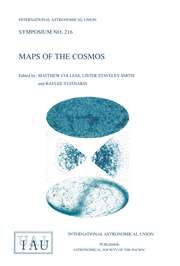Article contents
Tidal Interactions in M81 Group
Published online by Cambridge University Press: 25 May 2016
Extract
At a distance of 3.3 Mpc, M81 group is one of the nearest groups of galaxies and thus an ideal place to study various galactic phenomena. Observations at all wavelengths can be made with high sensitivity and excellent spatial resolution (1″ = 15 pc). The three core members M81, M82, and NGC 3077 are known to be closely interacting from the 21cm HI emission studies (van der Hulst 1979, Yun et al. 1993, 1994), and all three galaxies show evidence for an AGN or starburst activity, possibly induced by the on-going tidal interactions. A more distant member NGC 2976 also shows evidence for tidal interaction within the group (Appleton et al., 1981). Therefore M81 group is an excellent test ground for studying tidal interaction and tidally induced activities.
Information
- Type
- Tidal Interactions
- Information
- Copyright
- Copyright © Kluwer 1999
References
- 7
- Cited by

